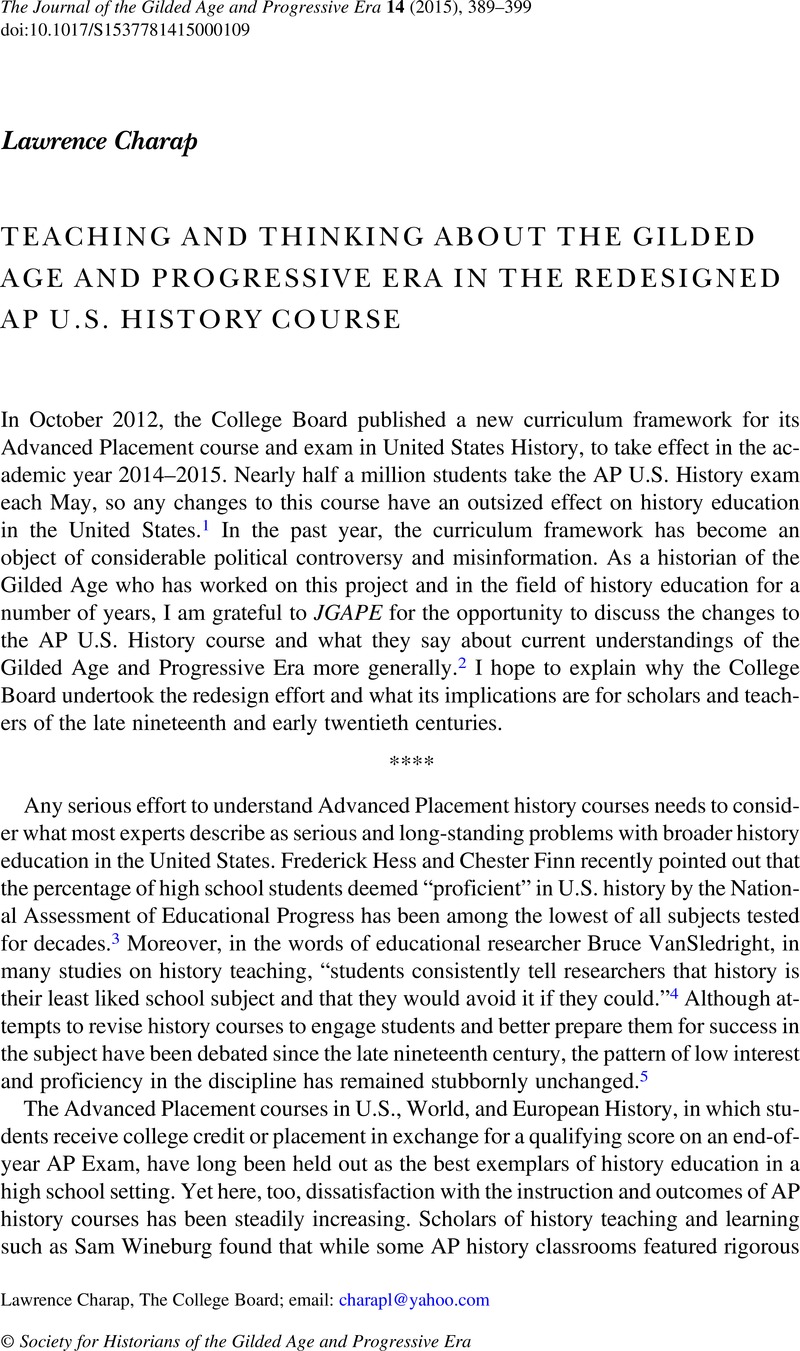No CrossRef data available.
Published online by Cambridge University Press: 22 July 2015

1 In this document I will use the term “curriculum framework,” which first appeared in 2012, interchangeably with the term “course framework” as well as a slightly expanded version, the AP U.S. History Course and Exam Description, published by the College Board in early 2014.
2 I have discussed some aspects of this project in greater detail elsewhere. See Charap, Lawrence, “Rethinking the American Past,” OAH Magazine of History 27 (2013): 31–34CrossRefGoogle Scholar; Lawrence Charap, “Assessing Historical Thinking in the Redesigned Advanced Placement United States History Course and Exam” in Peter Seixas and Kadriye Ercikan, eds., Assessing Historical Thinking (New York: Routledge, 2015).
3 Frederick M. Hess and Chester Finn, Jr., “Getting Our History Right,” National Review Online, September 23, 2014; http://www.nationalreview.com/article/388621/getting-our-history-right-frederick-m-hess-chester-e-finn-jr.
4 Bruce VanSledright, In Search of America's Past: Learning to Read History in Elementary School (New York: Teachers College Press, 2002).
5 See Launius, Roger D., “Public History Wars, the ‘One Nation/One People’ Consensus, and the Continuing Search for a Usable Past,” OAH Magazine of History 27 (Jan. 2013): 31–36CrossRefGoogle Scholar; Pace, David, “The Amateur in the Operating Room: History and the Scholarship of Teaching and Learning,” American Historical Review 109 (2004): 1171–92CrossRefGoogle Scholar.
6 Wineburg, Sam, “Crazy for History,” Journal of American History 90 (2004): 1401–14CrossRefGoogle Scholar.
7 National Research Council. Learning and Understanding: Improving Advanced Study of Mathematics and Science in U.S. High Schools (Washington, DC: National Academy of Sciences, 2002).
8 Tamar Lewin, “Harvard to Require Top Score To Earn Advanced Placement,” New York Times, February 22, 2002.
9 Eddy Ramirez, “Some High Schools Are Dropping Out of the Advanced Placement Program,” U.S. News & World Report, September 19, 2008.
10 Grant Wiggins and Jay McTighe, Understanding by Design: Expanded 2nd Edition (Alexandria, VA: Association for Supervision and Curriculum Development, 2005).
12 Historian Rebecca Edwards added quotation marks around the term in the second edition of her recent overview of the period. See Rebecca Edwards, New Spirits: Americans in the Gilded Age: 1865–1905, 2nd ed. (New York: Oxford University Press, 2010).
13 Several representative historical works with this theme might include Alan Brinkley, The End of Reform: New Deal Liberalism in Recession and War (New York: Vintage, 1995); Patrick D.Reagan, Designing a New America: The Origins of New Deal Planning, 1890–1943 (University of Massachusetts Press, 2000); Linda Gordon, Pitied but Not Entitled: Single Mothers and the History of Welfare, 1890–1935 (New York: Free Press, 1994).
14 An overview of recent “history wars” in historical perspective can be found in Hartman, Andrew, “‘A Trojan Horse for Social Engineering’: The Curriculum Wars in Recent American History,” Journal of Policy History 25 (2013): 115–36CrossRefGoogle Scholar. An account of the National History Standards debate cowritten by one of the participants can be found in Gary B.Nash, Charlotte Crabtree, and Ross E. Dunn, History on Trial: Culture Wars and the Teaching of the Past (New York: Knopf, 1997).
15 “JeffCo Students ‘Think Like a Historian’ Under New AP History Guidelines,” Colorado Public Radio, October 1, 2014, http://www.cpr.org/news/story/jeffco-students-think-historian-under-new-ap-history-guidelines.
16 Waylon Lewallen, “What's Happening to the APUSH Course and Exam? Part Two,” August 18, 2014, NEH EDSITEment! Blog, http://edsitement.neh.gov/blog/2014/08/18/whats-happening-apush-course-and-exam-part-two.